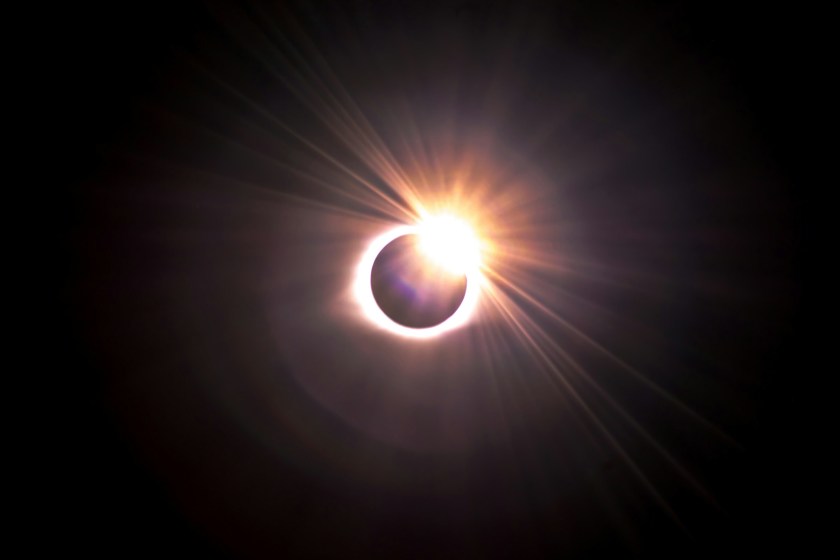Buy one pair of eyeglasses, get a second pair 50% off!
*Restrictions apply. Click here for details.

Solar Eclipse 2024: How to Protect Your Eyes During the Eclipse
Written by Dr. Elaine Ramos, OD, Nationwide Vision
We're preparing for a magnificent celestial event – the Solar Eclipse on April 8th, 2024. During this unique occurrence, the Moon will slowly move in front of the Sun, temporarily obscuring it. Certain areas in the United States will experience the full shadow of totality, plunging them into darkness, while elsewhere, observers will notice the Moon gradually obscuring the Sun.
But prioritizing safety is essential! Before you look towards the clouds, knowing how to safely observe the eclipse is essential. There are vital safety tips to follow and potential risks to avoid. Dr. Elaine Ramos, O.D., an experienced optometrist with EyeCare Partners, will provide expert guidance on how to view the solar eclipse without damaging your eyes. Before taking part in this exciting celestial event, you need to make absolutely sure that you are using the appropriate equipment to keep your eyes safe. Not taking the proper steps could put your eyes at risk for permanent damage.
The Eye Health Risks of Eclipse Viewing
The Sun's brightness is too intense for the naked eye under normal conditions, and looking at it directly, even with polarized sunglasses, can cause serious eye problems like solar retinopathy. When you stare at the Sun, you are placing the center of your vision, the fovea, directly into the light’s path. The Sun’s intense light then causes damage to the fovea and surrounding retinal cells, causing blurry vision or even loss of central vision.
The risks remain high during a solar eclipse. Despite the Moon partially covering the Sun, the light that penetrates through is still dangerously strong, especially during the total eclipse phase where the Sun is almost completely obscured yet its light is potent. Another name for solar retinopathy is actually eclipse retinopathy because of how dangerous this event is on the eyes. So even if it seems like the light isn’t as bright, the light that still makes it to your eyes is just as intense as any other day. This is why staring directly at the solar eclipse without any protection is going to place your eyes at a significant risk for damage.
To check how much of the Sun will be obscured in your location, you can use tools like the Eclipse Cities tracker.
Guidelines for Safely Observing the 2024 Solar Eclipse
Experiencing a solar eclipse is unforgettable, but only when taking proper precautions to protect your eyes. Fortunately, there are several ways to safely enjoy the eclipse without risking your vision.
Specialized Solar Eclipse Glasses
Direct observation of the solar eclipse requires the use of solar eclipse glasses, which are far more effective than regular sunglasses. These glasses are designed to filter out over 99.999% of the sunlight, enabling you to safely look at the eclipse. Ensure that the glasses you select are certified with the ISO 12312-2 standard, which indicates they are suitable for eclipse viewing. The American Astronomical Society provides a list of reliable vendors offering these essential safety glasses.
Participate in Observatory-Hosted Eclipse Events
Observatories frequently take advantage of solar eclipses to host events that both educate and provide a safe viewing experience. If there's an observatory in your vicinity, check out their scheduled events for the eclipse day. They might offer free eclipse glasses or set up a live broadcast of the eclipse on large screens, allowing you to witness the event safely, even if you're outside the path of totality.
Create a DIY Eclipse Viewing Box
If obtaining eclipse glasses or attending an event at an observatory isn't an option, making a Sun Viewer is a fun and safe alternative. This device is intended for indirect viewing, where it projects an image of the sun onto a surface inside the box, like a pinhole projector but potentially with a larger view. This do-it-yourself approach is a great way to safely watch the eclipse unfold from the comfort of your home.
Safely Experience the Rare Solar Eclipse in 2024
In anticipation of this incredible celestial occurrence, prioritizing safety is key to ensuring a positive and unforgettable viewing experience. With the next solar eclipse not expected in the United States for another two decades, protecting your vision is of utmost importance. Equipping yourself with the correct eye protection is crucial to enjoying this year's awe-inspiring solar eclipse without risking eye health, and by preparing for the event, you can safely enjoy the spectacle without an unplanned optometrist appointment.
About the Author: Dr. Elaine Ramos, OD

Dr. Elaine Ramos, OD, received her Bachelors of Science degree from California State University, Fullerton and earned her Doctorate of Optometry from Marshall B. Ketchum University. She completed a residency in vision therapy and neuro-rehabilitation from the State University of New York College of Optometry.
Prior to joining Nationwide Vision, Dr. Ramos was an assistant professor at Western University College of Optometry in Pomona, CA and adjunct professor at Midwestern University in Glendale, AZ where she practiced in the pediatrics and vision therapy clinics. She currently resides in Peoria, AZ with her husband, baby girl, and corgi named Butters.
